
Submitted by Jane Durkin on Wed, 09/06/2021 - 09:11
Sarah Morgan is a Research Fellow at the University of Cambridge Department of Computer Science and Technology, a Senior Research Associate at the Department of Psychiatry, University of Cambridge, and a Fellow at The Alan Turing Institute.
Her research applies data science approaches – including machine learning, network science and natural language processing – to better understand and predict mental health.
She is currently working on an EU-funded project, PSYSCAN, using MRI brain images to better diagnose and understand schizophrenia. MRI brain networks from patients with schizophrenia often show altered connectivity patterns compared to healthy volunteers. Sarah's research explores whether we can use these connectivity patterns to predict individual patients' disease trajectories, and what they can teach us about the biological mechanisms underlying schizophrenia.
In addition, at The Alan Turing Institute she leads a project investigating the potential of disorganised speech to predict risk of psychotic disorders.
Sarah is a co-organiser of the Cambridge Networks Network, which brings together researchers from in and around Cambridge with an interest in complex networks. She is also passionate about making STEM more diverse, and co-founded Cavendish Inspiring Womxn, the Cambridge group for women and non-binary people in physics.
Sarah holds a PhD in Theoretical Physics from the University of Cambridge and a Master’s degree in Physics from the University of Exeter.
Sarah will be presenting her research on Assessing psychosis risk using quantitative markers of transcribed speech at the Cambridge Language Sciences Symposium for Early-Career Researchers on 24 June 2021.
Twitter @Sarah_Morgan_UK
My research sets out to predict and understand mental health conditions, with a particular focus on schizophrenia. Mental health conditions can be extremely debilitating, and are still relatively poorly understood. There is also a clinical demand for tools that can predict individual patients’ disease trajectories for mental health conditions such as schizophrenia. To help meet these challenges, I apply a range of data science techniques to study both transcribed speech data and MRI brain scans. This includes methods from machine learning, network science and Natural Language Processing.
I’m based at the Department of Computer Science and Technology in West Cambridge, and also affiliated to the Psychiatry Department at Addenbrookes. But the pandemic has meant I’ve been working from home since March 2020! I’m lucky that my work is computational, so I can do everything from home quite easily, although I do miss meeting colleagues face to face. Most days involve a mixture of analysing data, writing papers, grant applications and talks and meeting colleagues to discuss research. I recently started supervising a post-doc and an MPhil student and the highlight of my week is meeting them and hearing what they have been doing! I also do small amounts of teaching, for example in February I taught a short course on ‘Applications of Machine Learning to Psychiatry’ to a group of Computer Science MPhil students.
The most interesting day I've had so far was when I recently held a Patient and Public Involvement (PPI) session to get feedback on a manuscript I’m writing from people with lived experience of mental health conditions. It was incredibly helpful to hear directly from people with lived experience what they thought the potential benefits and risks of my research are, and to get their ideas for directions to take the research in. Going forwards, I am in the process of setting up a panel of experts by experience to be involved with my research, which is something I’m particularly excited about.
I hope my research will lead to fresh insights into mental health conditions such as schizophrenia. Ultimately, I’d like to be able to translate my research to have a positive impact on patients’ lives, for example by developing new tools to predict individual disease outcome so that treatments can be better targeted.
Cambridge is a great place to be based because there’s so much exciting research taking place here! My work is very interdisciplinary, drawing on areas of machine learning, Natural Language Processing and network science. Cambridge is a centre of expertise for all those areas, which means it’s easy to find other scientists to collaborate and discuss ideas with.
